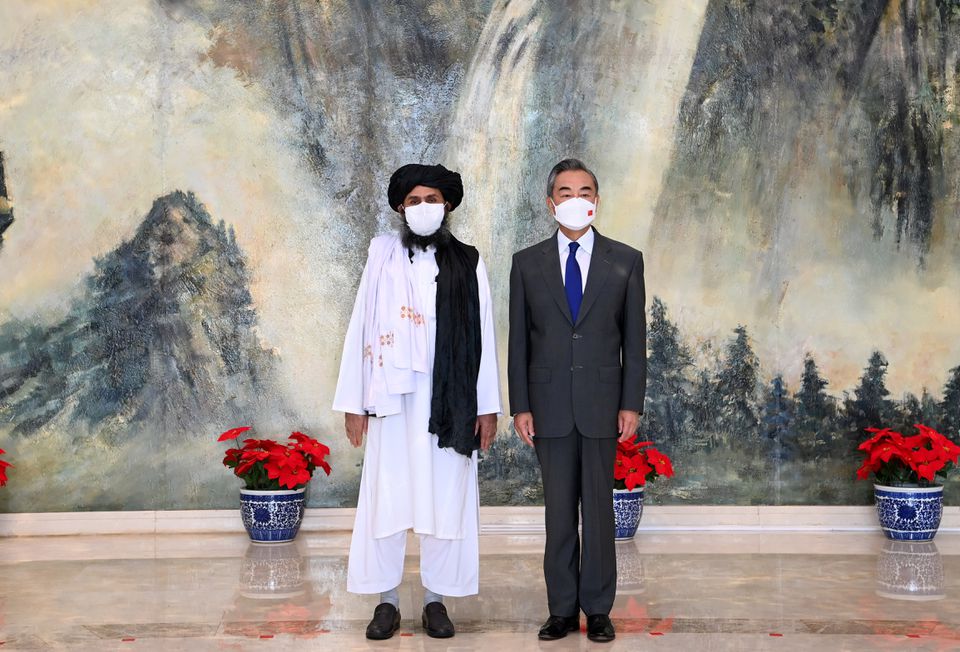Following the fall of Kabul, and departure of the last US cargo planes from Afghanistan, the Taliban celebrated victory and declared complete independence from foreign occupation on 30 August 2021. They subsequently announced an interim government on 7 September 2021. Currently, the Taliban enjoys complete authority over Afghanistan. However, the group is now faced with challenges on multiple fronts to efficiently run the affairs of the state.
Currently, Taliban’s immediate concerns are in the diplomatic, political, and economic domains. On the diplomatic front, the group needs international recognition as the legitimate government of Afghanistan. World powers have not yet announced any plan to formally recognize them. Rather, recognition and/or engagement are conditional upon Taliban’s fulfillment of promises, including the formation of an inclusive government for a pluralist political order and respect of fundamental human rights. With regards to security, the Taliban need to ensure law and order within the state and to not allow extremist groups to use Afghan soil to perpetrate acts of terror in other countries. Kabul’s economy is in ruins owing to decades of war and corruption. As several Western countries are opposed to the Taliban regime, the European Union (EU), The World Bank, and the International Monetary Fund (IMF) have suspended funding and aid to Afghanistan. The US has also frozen Afghan Central Bank’s USD 9.5 billion reserves. Taliban need to ensure flow of international assistance, smooth economic activity, running of critical infrastructures, funds for government employees, and prevention of a humanitarian crisis.
Failure of the new government in Kabul to govern efficiently would result in the collapse of the economy, rise in crime, resurgence of al-Qaeda, intensified activities of terrorist groups like the Islamic State-Khorasan Province (IS-KP), use of Afghan soil as a launchpad for terror activities across the border, illegal trade, and, humanitarian and refugee crises. Isolating, or in the words of Pakistan’s National Security Advisor, ‘abandoning’ the country, given its ‘new reality’, would have several negative implications for the international community, especially regional ones.
At this critical juncture, China has emerged as a supporter of Taliban’s rule and is likely to fill the void in Afghanistan left by Western powers. To assist the Taliban in dealing with their challenges, China has been playing a critical role as a neighboring country. While it has not yet formally recognized the new dispensation, the Chinese Foreign Ministry has issued a statement noting that Beijing would cooperate with the Taliban and establish friendly ties with the group. China also pledged to keep its embassy in Kabul open to support diplomatic relations and to stay actively engaged with the new setup in power. China has offered USD 31 million in aid to assist the Taliban in preventing a humanitarian catastrophe. Concurrently, it has also been actively lobbying at international forums to encourage international political recognition of the Taliban government. These developments are manifestations of Chinese interest in keeping itself engaged with the Taliban. Close cooperation between Beijing and the Taliban regime would allow both sides to benefit. Kabul will get some political legitimacy and economic investments, while Beijing would benefit from opening up of trade routes in Afghanistan for its Belt and Road Initiative (BRI).
China’s principal interest in Afghanistan is stability, political order, and rule of law. To ensure its security from militant groups inside Afghanistan, both China and the Taliban are actively engaged to address the issue. Chinese Foreign Ministry received a delegation of the Taliban in the northern Chinese city of Tianjin, in July 2021. While discussing the security issues, Chinese Foreign Minister Wang Yi expressed high hopes that ‘the Taliban would crack down on the East Turkestan Islamic Movement as it was a direct threat to China’s national security.’ The Taliban have assured China of full cooperation on security issues. In July 2021, the Taliban spokesperson Mohammed Naeem assured China that the Taliban ‘will not allow anyone to use Afghan soil against China.’ Moreover, the Taliban, after seizing control of Kabul, promised to establish peaceful relations with all countries and reiterated security assurances, including to the US and China.
A stable Afghanistan will promote Chinese economic interests in Afghanistan, Pakistan, and Central Asia. China is willing to expand its BRI projects and transport routes involving Afghanistan. In this regard, on 2 September 2021, the Taliban spokesman Zabihullah Mujahid dubbed China as the group’s ‘main partner’ in preventing Afghanistan from economic collapse. Mujahid expressed the Taliban’s willingness to participate in China’s BRI project and called it an opportunity for investment and reconstruction of Afghanistan. While welcoming China to modernize Afghanistan’s copper and other mineral mines, the Taliban also expressed interest in participating in the China-Pakistan Economic Corridor (CPEC), the flagship USD 50 billion Pakistan component of Beijing’s BRI project. Initiated in 2013, CPEC aims at the construction of key infrastructure projects in Pakistan.
Therefore, the aforementioned mutual interests of both Beijing and the Taliban suggest that the two sides have intricate interdependency. China needs to act proactively to ensure its vital national interests. Likely, the Taliban find China’s backing of utmost necessity as a close ally to offset Western criticism. Hence, both consider each other inevitable partners for regional peace, stability, and cooperation.
Moiz Khan is a Researcher at Centre for Aerospace & Security Studies (CASS), Islamabad, Pakistan. He can be reached at cass.thinkers@gmail.com
Image Source: Charlotte Greenfield, “Analysis: As West ponders aid for Afghanistan, China and Pakistan quick to provide relief”, Reuters, September 13, 2021, https://www.reuters.com/world/middle-east/west-ponders-aid-afghanistan-china-pakistan-quick-provide-relief-2021-09-12/




